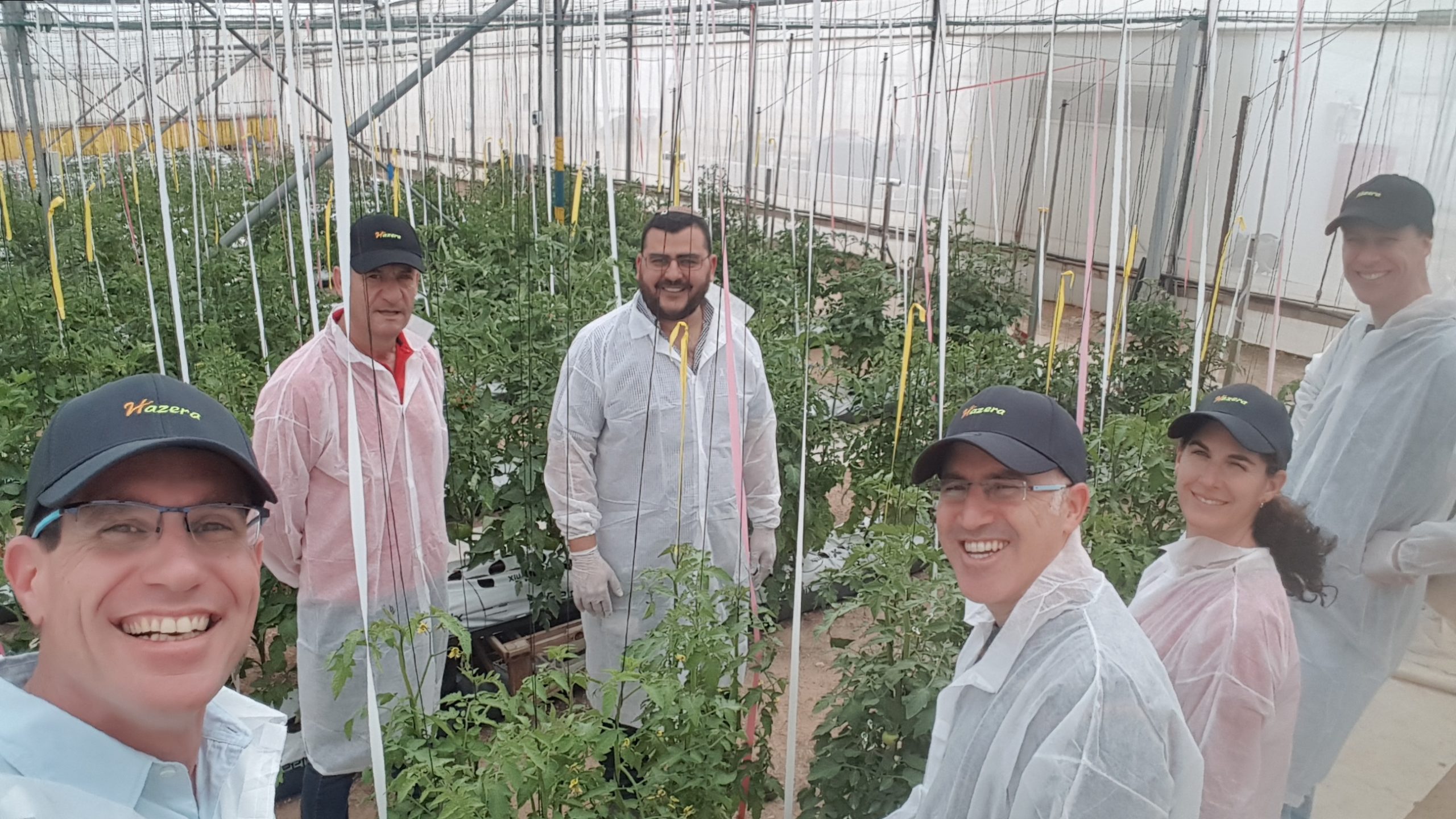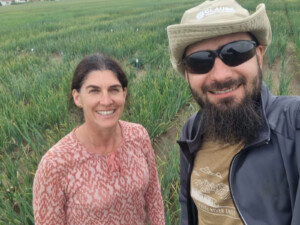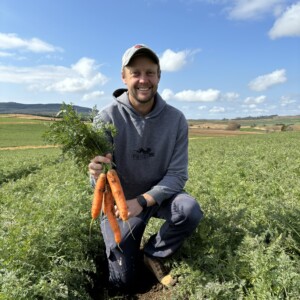“The work in the greenhouses, the experiments, and responding to the needs of the Breeders are among the most complex phases in the process of breeding our varieties.”
Interview with Elad Shalit, Global R&D Operations Director, Hazera

In Hazera, a global company which breeds, develops, produces and markets variety of vegetable seeds for growers around the world, the production of seeds for research and development (R&D) is an extremely important part of the process. In order to maintain the continual launch of new, improved vegetable varieties, it is necessary to ensure that the seeds, of the desired quantity and required quality, will arrive at their testing destinations on time. Fruited vegetable varieties are usually targeted to one of the two seasons, Spring or Autumn. One main challenge is to produce seeds during the “counter-season”, opposite to the season targeted for variety trials, since it is not optimal for variety performance. This is not a simple task, and requires a high level of flexibility, agility and creative innovation.
We met with Elad Shalit to hear about Hazera’s R&D Operations, which is an essential part in the successful development of high-performing vegetable varieties. We learned how complex the process is and how it is integral to the advancement of their varieties in the market. Operations is the platform that facilitates the advancement of new varieties by Breeders and Scientists and Trial Managers from concept and genetic material through different growth processes to execution of performance trials in the target markets.
Elad is Hazera’s Global R&D Operations Director for greenhouses and open fields. He is responsible for 11 R&D sites around the world, with the main Breeding & Research centers in Israel and Holland.
“The work in the greenhouses, the experiments, and responding to the needs of the Breeders are among the most complex phases in the process of breeding our varieties,” says Elad.
The farm in Israel for breeding vegetable varieties covers an area of 24 hectares and has numerous greenhouses and other structures of various sizes, as well as the technological means to provide accurate growing conditions for each variety. “We supply seeds from Operations on time and in the required quantity, facilitating trials according to the climatic conditions of the different destination countries to which we export after the breeding process,” says Elad. Hazera’s advanced technological capabilities enable the company to improve breeding conditions and accelerate development timelines for the introduction of new and innovative traits to the varieties, for improvement of product quality, horticultural performance, resistance to diseases and other pests, and tolerance to stresses.
As part of the Limagrain Group, Hazera benefits from collaborations in Operations and other functions which augment technological capabilities and enable implementation of systems and processes that have already been tested by Limagrain. Limagrain defines high standards for all of its sites worldwide, including environmentally-friendly farming models, reduction of impact on the ecosystem, employment and labor practices, and more. These norms that have been implemented in Hazera operations at all stations, and in accordance with the requirements of each country.
The first phase of the breeding process maps the target market and its needs, and identifies characteristics of successful varieties and key players. In a second phase, the Breeders and Scientists study the genetic material available for that market and compare it to the varieties already in the market, to design and develop the type of product that can have impact. Operations then goes into high gear to help provide the best approaches for the opportunity. It works continuously with the Breeders to prepare and provide the best quality hybrid seeds needed for testing, selection and demonstration: for the target market: choosing optimal growing methods, controlling the process, and sending seeds to the destination country for the performance and demonstration trials.
Adapting the Growing Conditions to Its Genetics
One of the roles of Operation is to adapt the growing conditions to the needs of the crop: greenhouse type and size; ventilation, heating, cooling and irrigation conditions; fertilization; type of medium (soil type or soil-less medium). All these are intertwined, and the process must be closely monitored while ensuring the conditions are adapted optimally to the plants.
Another variable that affects conditions is genetic diversity. For example, one R&D greenhouse may have up to 1,000 different varieties and the genetic diversity may require different conditions for each variety. The processes in this case must accommodate this variability to ensure success in growing the plants.
Operations Team
The large variety of crops and the flexibility required to adapt the varieties to the target markets pose a great challenge for Hazera’s Operations. Success in managing these demanding requirements is very much dependent upon close cooperation between Operations and the Breeding Department, and collaborative support of R&D Laboratories and Quality Assurance Testing throughout the entire process.
“The vast experience of our teams is the foundation for the development of our processes to comply with the breeding requirements. Professional expertise, in-depth knowledge of the genetic materials, and interchange of innovative ideas lead to improved quality and efficiency,” says Elad Shalit.
Seeds Health
“During the production process, it is very important to maintain the genetic material free of any disease, and for that reason the greenhouses are treated like fortresses,” continues Elad. “Since any contact with the plants with our clothes or hands can leave infectious residues for some diseases, which can be transmitted onwards (similar to the current global COVID-19 pandemic), the rules for entering the site are extremely strict. There’s also frequent pest control, as pests can also be vectors that carry disease. We also sample the plants (leaves and seeds), to assess their health status, before seeding, during the growing and after picking. All of these measures enable us to maintain a clean phytosanitary environment that acts as an isolated island or fortress,” he says.
Nursery
“Hazera is not a commercial nursery; however, we want to maintain the genetic material in the company, so almost all seedlings come from our own nursery. During the breeding process, our nursery provides seedlings also to external growers and to the breeding greenhouses, all year round,” says Elad.
The nursery is equipped with all the systems required in a commercial nursery, including automatic irrigation, fertilization, and crop-management systems, and has the ability to grow plants with strong root and shoot systems. All these enable the nursery to produce healthy seedlings for transplanting in greenhouses and fields. Then, due to phytosanitary reasons, once a seedling is moved out of the nursery (transplanting, sampling, etc.), it cannot be returned.
Safety
Last, but not least – Safety is regarded as an integral part of Hazera’s culture. Operations is a very interesting department, as it involves a wide range of activities, automation mechanisms, processes, and infrastructures. “Our scope of operations and work conditions demand that we pay careful attention not only to the plants but also, and in particular, to the people doing the work, our teams,” adds Shalit. “We frequently conduct safety and risk surveys with professionals and our teams, invest in theoretical and hands-on training of our employees, and encourage them to report risks, malfunctions and hazards. We are all committed to the highest work standards. We do not save on expenses and improvements to ensure a safe work environment.”
Stay tuned for the second part of this article to be further focused on the technological breakthroughs implemented, that will be published on Israel Agri.
The article was first published in Israel Agri






